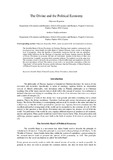| dc.contributor.author | Kopsidas, Odysseas | |
| dc.contributor.author | Hadjixenofontos, Andreas | |
| dc.date.accessioned | 2021-04-14T07:08:08Z | |
| dc.date.available | 2021-04-14T07:08:08Z | |
| dc.date.issued | 2018 | |
| dc.identifier.uri | http://hdl.handle.net/11728/11902 | |
| dc.description.abstract | The Invisible Hand of Divine Providence in Christian Theology leads mankind continuously with
teleological aim. Adam Smith's Invisible Hand of Political Economy leads society to the highest
level of prosperity, where the benefits of households, businesses and the state are optimized.
Adam Smith, influenced by the Theology of Augustine and Thomas Aquinas, transfers the Hand
of Divine Providence to economic life and lets individuals function on the basis of their own
interest and the 'sympathy' governing their economic relations. Two patterns run at the same time.
The economic circuit is driven by the good choice of the invisible hand, and mankind is driven by
the good providence of God. The purpose of our work is to present this coincidence of the two
"long hands" of God and the Economy and the influences that the Philosophy of Ethical Emotions
of Political Economy has received from Theology. | en_UK |
| dc.language.iso | en | en_UK |
| dc.publisher | David Publishing | en_UK |
| dc.relation.ispartofseries | Economics World;Vol. 6, No. 3, pp.248-250 | |
| dc.rights.uri | http://creativecommons.org/licenses/by-nc-nd/4.0/ | en_UK |
| dc.subject | Invisible Hand | en_UK |
| dc.subject | Political Economy | en_UK |
| dc.subject | Divine Providence | en_UK |
| dc.subject | Adam Smith | en_UK |
| dc.title | The Divine and the Political Economy | en_UK |
| dc.type | Article | en_UK |
| dc.doi | 10.17265/2328-7144/2018.03.009 | en_UK |


